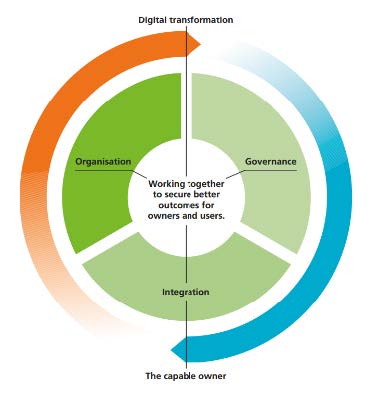Project 13 has hit the ground running: with the driving force of the ICE behind it, major industry clients on board and early adopters reporting positive signs, this new approach to infrastructure project delivery is only going to increase in profile and proliferation across the construction industry.
What does this mean for your business, and what can you do now to prepare yourself for wide-scale use of the Project 13 approach?
What is project 13?
As put by the ICE on the Project 13 website; “Project 13 is an industry-led response to infrastructure delivery models that fail not just clients and their suppliers, but also the operators and users of our infrastructure systems and networks.”

Source: http://www.p13.org.uk/
This comes in the form of a new way of thinking which seeks to “boost productivity in delivery, improve whole life outcomes in operation and support a more sustainable, innovative, highly skilled industry”; representing a move away from current transactional, short-term models to more collaborative, enterprise driven practices delivering long-term benefits to all parties.
The Infrastructure Client Group (with representation by experts from a range of high profile industry clients) and the ICE developed this approach in response to poor productivity levels, low profit margins and low perceived value within the industry.
At its heart Project 13 is about moving away from the delivery of scope and instead towards the delivery of value by facilitating increased collaboration between project stakeholders. This is achieved by replacing multi-tiered commercial models with integrated organisations whose partners are commercially aligned and incentivised. Thus removing the potential for competing objectives and dispute, and instead encouraging all parties to pull in the same direction.
Adoption of this new way of thinking is intended to encourage new approaches in leadership and governance. For example, rewarding stakeholders for value added to the overall project objectives, rather than individual services provided.
In the new NEC4 Alliance Contract, as launched June 2018, you can find an approach to the delivery of this new operating model; facilitating increased collaboration by engaging multiple partners within the supply chain under a single contract (it’s important to note though that Project 13 is more of a business model than a contract).
Why does Project 13 matter to you?
To provoke a shift in the fundamental ways that we do business across the industry, project 13 was developed. As such it’s critical for businesses to understand what it’s about and its practical implications, in order to maintain their competitiveness over the coming years.
Here are eight reasons your business needs to prepare for Project 13 now, rather than waiting for it to impact you:
1. Project 13 is already out there
Several early adopters have already been working to the guidelines of Project 13, and they’re big fish: Anglian Water, Heathrow Expansion, the Environment Agency and the National Grid, so if you’re looking to work with the likes of them you’ll need to at least understand what Project 13 is about.
2. It matters to your clients
Major industry clients through the ICG developed Project 13. This means, regardless of the success or failures of early adopters, Project 13 represents what top clients are looking for. Therefore, understanding the details will position you well to work with them and provide insight into their changing needs.
3. Existing models won’t deliver
Existing delivery models do not facilitate sustainable working practices or the delivery of long-term value. Therefore, current delivery models will no longer be seen as capable of delivering value for money as alternative models arise in line with Project 13 which offer improved value realisation and long term benefits.
4. Supply chain power dynamics will change
The proposed enterprise structure brings suppliers (subcontractors) much closer to the owner (client) than in current delivery models; greatly increasing their stake in delivery, their negotiating power and moving away from a traditional, transactional approach to procurement.
5. How you work with project stakeholders will change
An enterprise structure will also change how you engage with other project stakeholders, especially if using the new NEC4 Alliance Contract. Other contractors/ subcontractors, previously considered stakeholders, may now be partners within a single contract. This necessitates collaborative practices that were previously encouraged.
6. Performance measurement and payment will change
In this same vein, performance measurement will be less concerned with how you are delivering discrete packages of work and instead how you and your partners are contributing to the overall achievement of the project objectives. This represents a significant shake-up of the existing practice. Following on from this payment mechanisms will inevitably change from existing norms in order to align with project objectives.
7. It’ll bring a new approach to risk
The traditional approach of risk being transferred down the supply chain is coming to an end. Traditionally, regardless of who within the supply chain ‘owns’ the risk, the overall impact of risk remains with the owner. This practice will be replaced, thus strengthening the delivery alignment with the owner’s overall project goals.
8. You’ll need to work across alternative systems and platforms
Partnerships formed within the enterprise structure will require improved communication between different businesses’ systems and platforms. So, to achieve the highest level of collaboration, there should be agreement within the partnership of a single preferred platform. This will require flexibility and staff proficiency across multiple software options.
The way infrastructure projects are being procured and delivered is changing in the UK (and further afield). To meet these changing needs of clients and delivery partners, it is essential to understand the required changes and prepare.
What can you do to prepare for Project 13?
- Get up to speed; information is available through the Project 13 website, the ICE portal and the Alliance contract from the NEC. In addition, look out for dedicated briefing sessions from the ICE in your region.
- Talk about it; engage clients and colleagues to get their perspective on changes this could bring and what they’re doing to prepare. You might learn something from them, they might learn something from you, it may even create new business opportunities.
- Prepare your team; ensure that members of your team or your business are aware of the potential for change too. They may not need to know the full details, but there are elements which will apply to pretty much everyone. By leading the conversations about Project 13 you can shape it positively and as an opportunity.
- Get in touch; we see opportunities for businesses to re-position themselves and form innovative partnerships in the delivery of the Project 13 approach.
As such we’ve spent time researching the topic and forming some ideas of how this could be achieved.
If you want to find out more about Project 13, get in touch!
You can call on +44 (0)20 7404 4826 or email us at info@logikalprojects.com
Or you can use the contact us form here.






